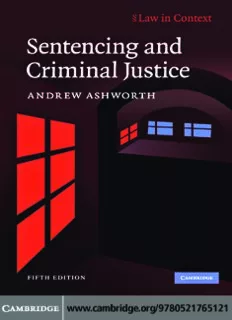
Sentencing and Criminal Justice (Law in Context) PDF
Preview Sentencing and Criminal Justice (Law in Context)
This page intentionally left blank Sentencing and Criminal Justice Taking into account the Criminal Justice and Immigration Act 2008 and the CoronersandJusticeAct2009,thisoverviewofthekeyissuesinEnglishsentencing policy and practice provides unrivalled coverage ofone of the most high-profile stagesinthecriminaljusticeprocess. Thisfiftheditionlookscriticallyatthemachineryforproducingsentencing guidelines,theCourtofAppeal’sapproachtothecustodythreshold,theframe- work for the sentencing of young offenders and the abiding problems of previous convictions in sentencing. Andrew Ashworth takes into account criminologicalresearch,statisticaltrendsandtheoriesofpunishment,offering clearexplanationsoftherelationshipsbetweenlegislation,guidelinesandcourt decisions. He skilfully providesa rounded view of therelevant principlesand problemsofsentencingandcriminaljustice. Andrew Ashworth is Vinerian Professor of English Law in the University of Oxford. He was a Member of the Sentencing Advisory Panel from 1999 to 2009,andchairmanfrom2007to2009. TheLawinContextSeries Editors:WilliamTwining(UniversityCollegeLondon), ChristopherMcCrudden(LincolnCollege,Oxford)and BronwenMorgan(UniversityofBristol). Since 1970 the Law in Context series has been in the forefront of the movement to broadenthestudyoflaw.Ithasbeenavehicleforthepublicationofinnovativescholarly booksthattreatlawandlegalphenomenacriticallyintheirsocial,politicalandeconomic contextsfromavarietyofperspectives.Theseriesparticularlyaimstopublishscholarly legal writing that brings fresh perspectives to bear on new and existing areas of law taught in universities. A contextual approach involves treating legal subjects broadly, usingmaterialsfromothersocialsciences,andfromanyotherdisciplinethathelpsto explaintheoperationinpracticeofthesubjectunderdiscussion.Itishopedthatthis orientationisatoncemorestimulatingandmorerealisticthanthebareexpositionof legal rules. The series includes original books that have a different emphasis from traditionallegaltextbooks,whilemaintainingthesamehighstandardsofscholarship. Theyarewrittenprimarilyforundergraduateandgraduatestudentsoflawandofother disciplines,butmostalsoappealtoawiderreadership.Inthepast,mostbooksinthe serieshavefocusedonEnglishlaw,butrecentpublicationsincludebooksonEuropean law,globalization,transnationallegalprocesses,andcomparativelaw. BooksintheSeries Anderson,Schum&Twining:AnalysisofEvidence Ashworth:SentencingandCriminalJustice Barton&Douglas:LawandParenthood Beecher-Monas:EvaluatingScientificEvidence:AnInterdisciplinaryFrameworkfor IntellectualDueProcess Bell:FrenchLegalCultures Bercusson:EuropeanLabourLaw Birkinshaw:EuropeanPublicLaw Birkinshaw:FreedomofInformation:TheLaw,thePracticeandtheIdeal Cane:Atiyah’sAccidents,CompensationandtheLaw Clarke&Kohler:PropertyLaw:CommentaryandMaterials Collins:TheLawofContract Cranston:LegalFoundationsoftheWelfareState Dauvergne:MakingPeopleIllegal:WhatGlobalisationMeansforMigrationandLaw Davies:PerspectivesonLabourLaw Dembour:WhoBelievesinHumanRights?:ReflectionsontheEuropeanConvention deSousaSantos:TowardaNewLegalCommonSense Diduck:Law’sFamilies Fortin:Children’sRightsandtheDevelopingLaw Glover-Thomas:ReconstructingMentalHealthLawandPolicy Gobert&Punch:RethinkingCorporateCrime Goldman:GlobalisationandtheWesternLegalTradition:RecurringPatterns ofLawandAuthority Harlow&Rawlings:LawandAdministration Harris:AnIntroductiontoLaw Harris,Campbell&Halson:RemediesinContractandTort Harvey:SeekingAsylumintheUK:ProblemsandProspects Hervey&McHale:HealthLawandtheEuropeanUnion Holder&Lee:EnvironmentalProtection,LawandPolicy Kostakopoulou:TheFutureGovernanceofCitizenship Lacey,Wells&Quick:ReconstructingCriminalLaw Lewis:ChoiceandtheLegalOrder:RisingabovePolitics Likosky:TransnationalLegalProcesses Likosky:Law,InfrastructureandHumanRights Maughan&Webb:LawyeringSkillsandtheLegalProcess McGlynn:FamiliesandtheEuropeanUnion:Law,PoliticsandPluralism Moffat:TrustsLaw:TextandMaterials Monti:ECCompetitionLaw Morgan&Yeung:AnIntroductiontoLawandRegulation:TextandMaterials Norrie:Crime,ReasonandHistory O’Dair:LegalEthics Oliver:CommonValuesandthePublic–PrivateDivide Oliver&Drewry:TheLawandParliament Picciotto:InternationalBusinessTaxation Reed:InternetLaw:TextandMaterials Richardson:Law,ProcessandCustody Roberts&Palmer:DisputeProcesses:ADRandthePrimaryForms ofDecision-Making Scott&Black:Cranston’sConsumersandtheLaw Seneviratne:Ombudsmen:PublicServicesandAdministrativeJustice Stapleton:ProductLiability Tamanaha:Lawas aMeanstoanEnd:ThreattotheRuleofLaw Turpin&Tomkins:BritishGovernmentandtheConstitution:TextandMaterials Twining:GlobalisationandLegalTheory Twining:RethinkingEvidence Twining:GeneralJurisprudence:UnderstandingLawfromaGlobalPerspective Twining:HumanRights,SouthernVoices:FrancisDeng,AbdullahiAn-Na’im, YashGhaiandUpendraBaxi Twining&Miers:HowtoDoThingswithRules Ward:ACriticalIntroductiontoEuropeanLaw Ward:Law,Text,Terror Ward:ShakespeareandLegalImagination Zander:CasesandMaterialsontheEnglishLegalSystem Zander:TheLaw-MakingProcess Sentencing and Criminal Justice Fifth edition ANDREW ASHWORTH VinerianProfessorofEnglishLaw,UniversityofOxford CAMBRIDGEUNIVERSITYPRESS Cambridge, New York, Melbourne, Madrid, Cape Town, Singapore, São Paulo, Delhi, Dubai, Tokyo Cambridge University Press The Edinburgh Building, Cambridge CB2 8RU, UK Published in the United States of America by Cambridge University Press, New York www.cambridge.org Information on this title: www.cambridge.org/9780521765121 © Andrew Ashworth 2010 This publication is in copyright. Subject to statutory exception and to the provision of relevant collective licensing agreements, no reproduction of any part may take place without the written permission of Cambridge University Press. First published in print format 2010 ISBN-13 978-0-511-68380-0 eBook (Dawsonera) ISBN-13 978-0-521-76512-1 Hardback ISBN-13 978-0-521-74875-9 Paperback Cambridge University Press has no responsibility for the persistence or accuracy of urls for external or third-party internet websites referred to in this publication, and does not guarantee that any content on such websites is, or will remain, accurate or appropriate. Contents Preface page xi Tableoflegislativemeasures xiii Tableofcases xxi 1 AnintroductiontoEnglishsentencing 1 1.1 Courtsandcrimes 1 1.2 Theavailablesentences 3 1.3 Thegeneralstatisticalbackground 8 1.4 Thecriminalprocess 15 1.5 Theformalsourcesofsentencingdecisions 24 1.6 Informalinfluencesonsentencingpractice 41 2 Sentencingandtheconstitution 51 2.1 Theseparationofpowersinsentencing 51 2.2 TheSentencingAdvisoryPanel,theSentencing GuidelinesCouncilandtheSentencingCouncil 55 2.3 Constitutionalaspectsofthestruggleover sentencingpolicy 61 2.4 TheJudicialStudiesBoard 64 2.5 Thepositionofthemagistracy 65 2.6 EuropeanUnionlaw 67 2.7 Europeanhumanrightslaw 68 2.8 Conclusions 70 3 Sentencingaims,principlesandpolicies 71 3.1 Theaimsofthecriminaljusticesystem 71 3.2 Justifyingstatepunishment 74 3.3 Therationalesofsentencing 76 3.4 Someprinciplesandpolicies 95 3.5 SentencingrationalesandEnglish criminaljustice 100 viii Contents 4 Elementsofproportionality 104 4.1 Theproportionalityprinciple 104 4.2 Opinionsaboutoffence-seriousness 106 4.3 Developingparametersofordinalproportionality 108 4.4 Offence-seriousnessinpractice 115 4.5 Individualculpability 148 4.6 Proportionalityandoffence-seriousness 151 5 Aggravationandmitigation 156 5.1 Somepreliminaryproblemsofprinciple 156 5.2 Aggravationasincreasedseriousness 158 5.3 Mitigationasdiminishedseriousness 168 5.4 Personalmitigation 170 5.5 Mitigationandaggravationinpractice 188 5.6 Aggravationandmitigationintheory 191 6 Persistence,preventionandprediction 195 6.1 Historicalintroduction 195 6.2 Fourapproachestopunishingpersistence 197 6.3 PreviousconvictionsandtheCriminalJustice Act2003 206 6.4 Theproblemof‘professional’criminals 219 6.5 Persistentpettyoffenders 220 6.6 Civilpreventiveorders:theASBO 221 6.7 Minimumsentencesandselectiveincapacitation 224 6.8 ‘Dangerousoffenders’andthe2003Act 228 6.9 Conclusion 238 7 Equalitybeforethelaw 239 7.1 Theprincipleanditschallengers 239 7.2 Race 241 7.3 Gender 245 7.4 Employmentstatus 249 7.5 Financialcircumstances 251 7.6 Socialstatus 254 7.7 Equality,parsimonyandrisk 255 8 Multipleoffenders 260 8.1 Chargingthemultipleoffender 261 8.2 Concurrentorconsecutive? 263 8.3 Effectofthestatutoryprinciple 269
Description: